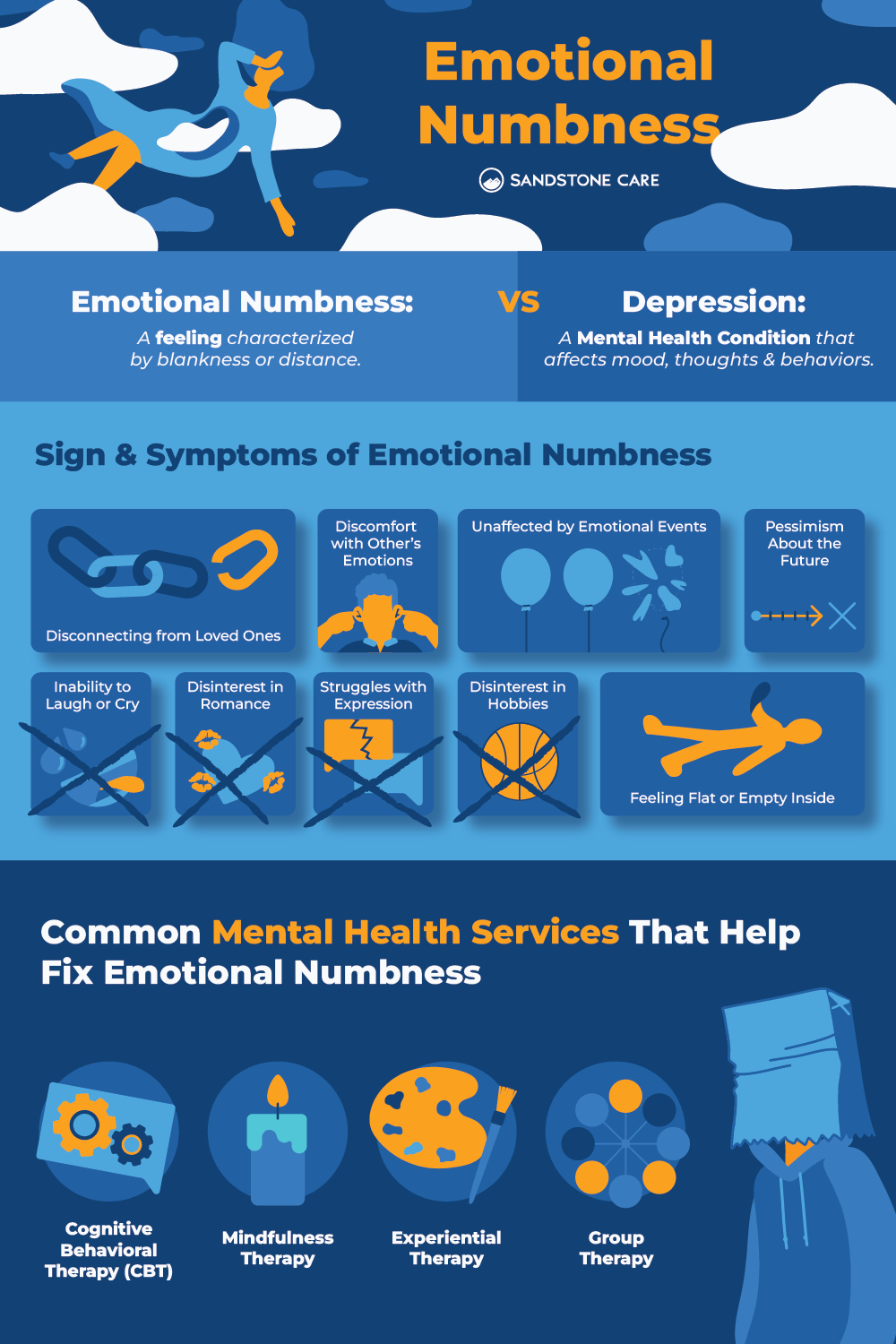Emotional Numbness Overview
What Is Emotional Numbing?
Emotional numbing is like a feeling of being emotionally “blank” or “distant.” It happens when someone finds it really hard to feel or show emotions, especially difficult emotions like sadness or anger.
People might experience this when they’re going through really tough times or have been through something really upsetting. Emotional numbing can act as a shield that helps them not feel overwhelmed by their emotions.
But, if it sticks around for a long time, emotional numbness can make it tough to connect with others and handle situations in a healthy way. It’s often linked to mental illnesses like PTSD and major depressive disorder.
Everyone experiences emotions differently. A certain movie might make some people cry and have no effect on others. This doesn’t mean those people are broken, just that they are unique.
People also experience recovery and transitions differently. For example, processing grief might happen quickly for some people, while others feel like they are on a roller coaster between healing and relapsing.
However, all humans should experience some type of emotion in different situations.
Emotional numbness is when you feel a strange lack of emotional reaction to situations that should affect you. You might feel dull or unexcited about situations that you would normally feel passionate about.
Things that used to upset you, don’t upset you anymore, and things that used to make you happy, suddenly feel flat.
For some, emotional numbness can make the days feel like they are blurring together, since every day is marked by the same dull emotional response. This can sometimes lead to a sense of “losing time.”
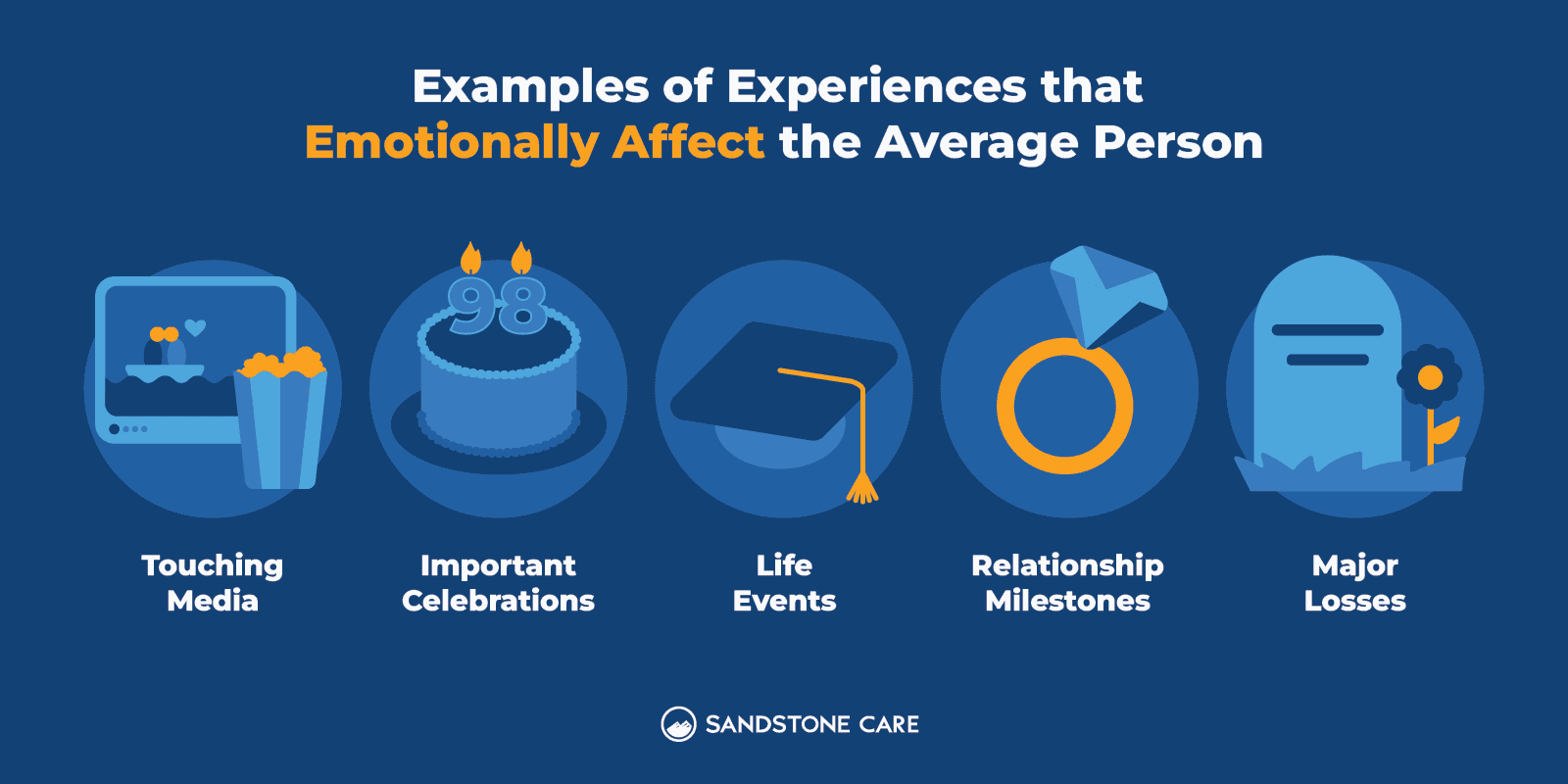
What Does It Mean to Become Emotionally Numb?
Being emotionally numb means that the brain and body are not experiencing feelings as intensely, or with as much variety, as is normal for a healthy person.
Those experiencing emotional numbness might feel like their feelings are “muted.”
Human beings have evolved to have a vibrant emotional landscape.
While sometimes having so many feelings can seem distracting or destructive, the depth of our emotions is a huge part of what defines us as human beings.
These emotions help us to survive by signaling danger or success, they help us connect with others by feeling empathy and attachment, and they help us to communicate what we want and need to ourselves and to each other.
When something upsetting happens, it is normal for a healthy person to feel angry or sad. These feelings affect their mood, behavior, and sometimes their physical body. This is normal.
Emotional numbness, however, could mean that you don’t feel angry, sad, or even happy. Your mood may not change, your behaviors feel empty, and you might feel disconnected from your body.
Because all people are unique, our emotions manifest in different ways. The same is true for emotional numbness.
You may relate to some symptoms and not others. You may experience some emotions, but they may not be as intense as they would normally be.
If you have any signs of emotional numbing, it’s important that you reach out to mental health professionals for help.
What Is the Difference Between Emotional Numbness and Depression?
There’s one main difference between depression and emotional numbness: depression is a mental health condition, while emotional numbness might be a sign or symptom of several different mental health challenges.
Emotional numbness is not a condition itself, but it can be a sign that something isn’t right. That could mean there is a mental health condition affecting your quality of life, or it could mean that something is overwhelming you in your life circumstances.
Even though emotional numbness isn’t always a sign of depression, it is a very common experience for people who have depression.
Some symptoms of depression that are related to emotional numbing include:
- Feeling flat or empty
- No longer enjoying activities that you used to enjoy
- Lack of motivation to engage in anything
- Disinterest in trying to connect with people and experience
- Becoming withdrawn or detached
Even if you feel confident that you know why you are feeling numb, sometimes several different circumstances are contributing to the issue.
This makes it very important to reach out to a mental health professional to make sure that you are tackling all of the causes of your emotional numbness in a healthy way.
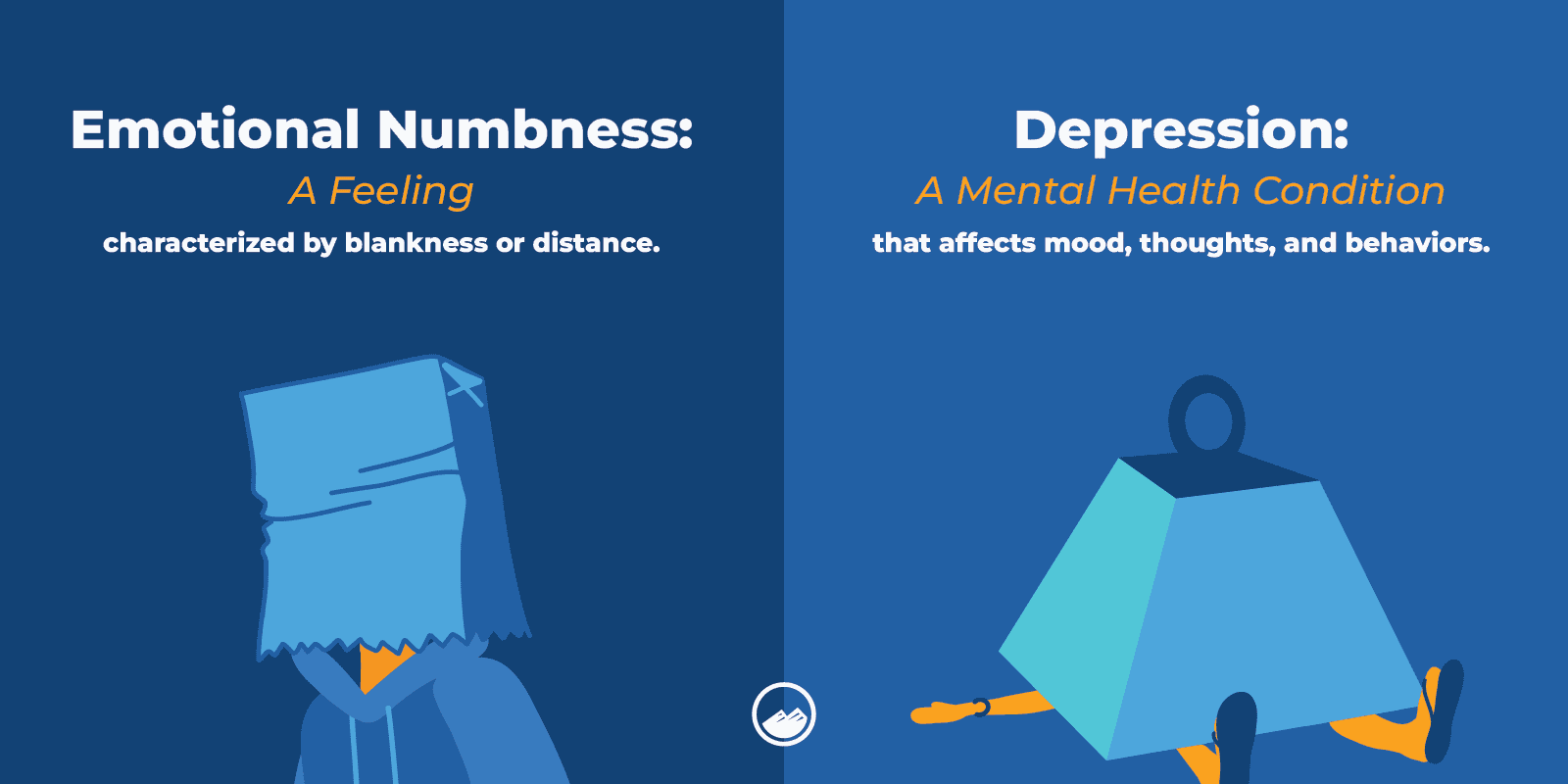
What Are the Terms For Emotional Numbness?
Some other terms for emotional numbness include:
- Emotional blunting
- Anhedonia
- Emotional dissociation
- Alexithymia
- Emotional detachment
These terms can be used to refer to a general lack of feeling and emotion.
However, you probably won’t hear the term “Alexithymia” when your friend is trying to express their sudden loss of emotions.
Terms or phrases you might hear from a loved one experiencing dulled emotions may include things like:
- “I can’t seem to care about anything.”
- “I feel nothing.”
- “I’m just going through the motions.”
Signs of Emotional Numbness
What Are the Signs and Symptoms of Emotional Numbness?
Some signs and symptoms of emotional numbness include:
- Feeling disconnected from friends and family
- Inability to cry or laugh even when you want to
- Lack of interest in sexual or romantic relationships (where it was previously present)
- Difficulty talking about emotions
- Feeling uncomfortable or disconnected when others show emotional responses
- Being unaffected by upsetting or joyous events
- Feeling flat or empty inside
- Loss of interest or enjoyment in hobbies
- Lack of excitement for the future
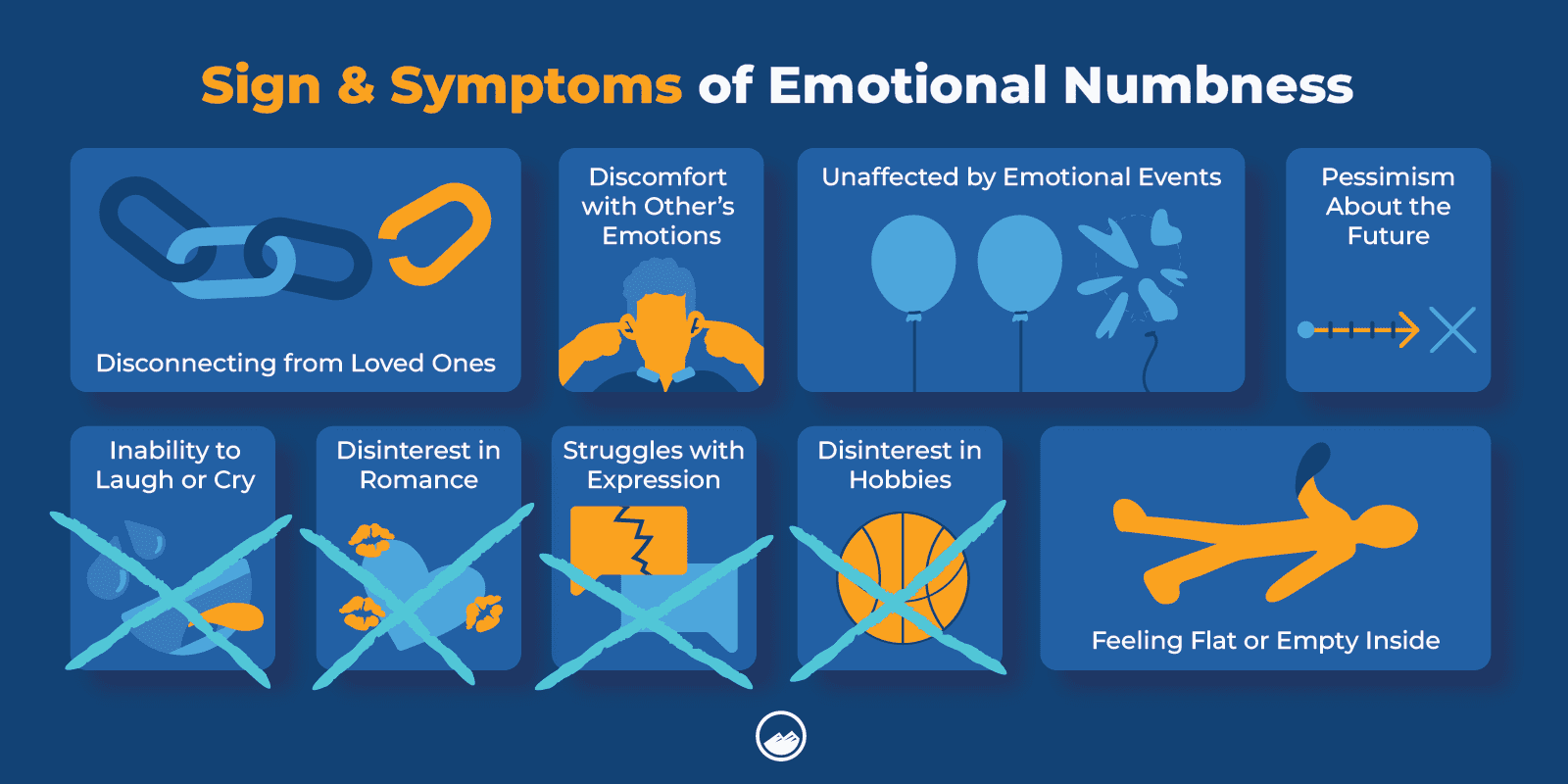
How Do You Know If You’re Becoming Emotionally Numb?
Emotional numbness can feel different for everyone, but if you are noticing a sudden change in your reactions, then it may be a sign that you are struggling with emotional numbness.
If something feels off, it probably is.
The bottom line is that you know yourself better than anyone else. It’s important to trust your instincts regarding your mental health. If you’re feeling mentally “off” in any way, contact a professional for help.
Other defense mechanisms are similar or linked to emotional numbness that professionals should also address. These include depersonalization and derealization.
Depersonalization is the feeling of being disconnected from yourself. This can go hand-in-hand with emotional numbness because emotions are a big part of the human experience.
You may feel like you don’t know yourself or like you’re a stranger watching yourself from outside of your body.
Derealization is feeling disconnected from the world around you or reality. You might feel like you’re in a dream or that the things happening to you aren’t fully real.
This is a dangerous feeling because it can lead you to make decisions without realizing the consequences.
What Do Suppressed Emotions Look Like in Others?
Suppressed emotions can look different depending on the person, but here are some signs to look out for in others:
- Holding back emotional responses such as crying
- Becoming withdrawn, especially in upsetting situations
- Avoiding talking about emotions
- Becoming irritated when asked about emotions
- Having a flat disposition when they normally don’t
- Feeling “fine” in situations where others are upset
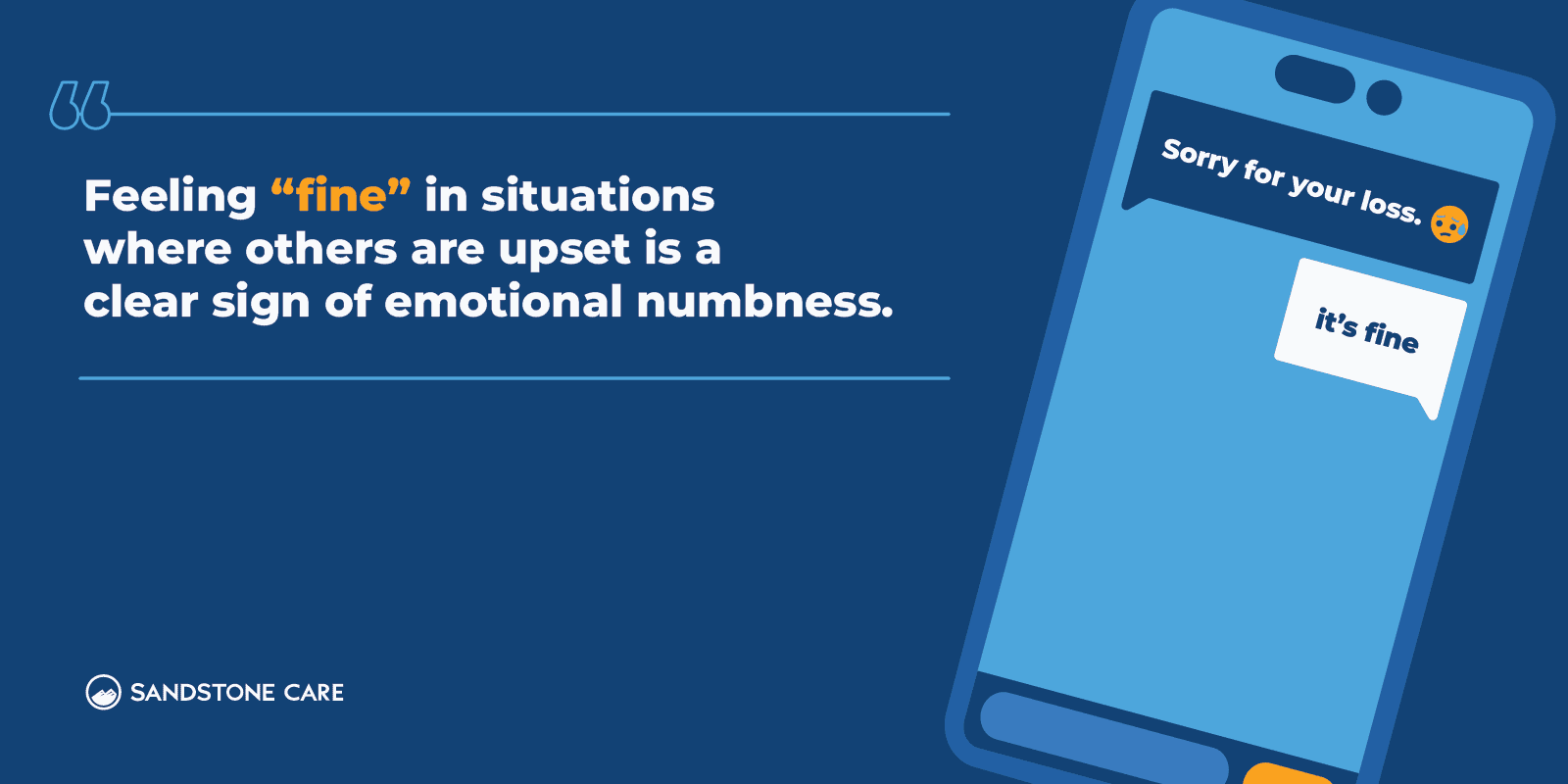
If someone you care about is presenting these signs, it’s important that they get help from professionals. Reaching out to them as a friend and offering your support could give them the push they need to get help.
Causes of Emotional Numbness
What Causes Emotional Numbness?
Emotional numbness can be caused by various issues, including serious mental health conditions. Some causes of emotional numbness include:
- Traumatic experiences, such as physical or emotional abuse
- Prolonged stress
- Chronic mental health issues
- Certain medications
- Mental fatigue or burnout
- Substance misuse
Past trauma is a common cause of emotional numbing.
When you experience a traumatic event, it’s not unusual for the memories of the event to haunt you.
You might experience flashbacks, which are intense memories that can make you feel like you’re reliving what happened.
Flashbacks and other upsetting experiences are tell-tale signs of post-traumatic stress disorder (PTSD).
Sometimes, those with PTSD stop feeling emotions as strongly as they battle with flashbacks of their traumatic experience.
This is part of the brain’s attempt to protect them from being too overwhelmed or distressed.
Defense mechanisms, like the numbing of emotions, are behaviors and thought patterns that your brain and body use to try and help lower the amount of internal stress you are experiencing.
Usually, you aren’t even aware that you are using them. This is different from coping mechanisms, which are conscious behaviors you use to manage a situation that is causing stress.
Emotional numbing is a defense mechanism against negative emotions.
The negative feelings can be caused by serious mental health conditions such as depression, anxiety, PTSD, bipolar disorder, borderline personality disorder, or schizophrenia.
You may also develop emotional numbness from prolonged stress in your personal or work life. Certain medications, such as selective serotonin uptake inhibitors (SSRIs), could also lead to emotional numbness.
Why Do I Feel Emotionally Numb?
You might feel emotionally numb because of an experience you are going through or a mental health condition that is detaching you from your feelings.
For example, after losing a close friend, someone might say, “I feel like I’m in a fog and can’t process what happened.” This is the well-intentioned effort by the brain to try and prevent them from being overwhelmed by the pain all at once.
After experiencing a traumatic event, like a car accident, someone might feel detached from their emotions. They might describe it by saying, “It feels like I’m watching my life happen from a distance, and nothing feels real.”
Emotional numbness can happen due to imbalances in brain chemicals like serotonin and dopamine, which regulate mood.
Chronic stress raises cortisol levels, disrupting areas of the brain that process emotions. Over time, ongoing stress can also lead to structural changes in the brain, making it harder to feel emotions.
If you notice these signs in yourself or someone you care about, talking to a mental health professional can help uncover the reasons behind the numbness and explore ways to reconnect with emotions.
What Causes Emotional Numbness in a Relationship?
Emotional numbness in a relationship can be caused by issues within the relationship or issues unrelated to the relationship.
Feeling a disconnection from your partner could be due to a variety of issues. You may be suffering from a mental health disorder or have trauma from a past experience. This can be particularly true if you have endured abuse in a previous relationship.
If the current relationship is physically, mentally, or emotionally abusive, this can also lead to feeling emotionally numb. Please contact someone you trust or the National Domestic Violence Hotline for help. You don’t have to suffer in silence.
What Are Drugs That Numb Emotional Pain?
Substance use or misuse can cause or contribute to emotional numbness. Drugs that can be used to numb emotional pain include:
- Antidepressants such as SSRIs
- Serotonin-norepinephrine reuptake inhibitors (SNRIs)
- Opioids (such as Oxycontin and heroin)
- Marijuana
- Alcohol
- Benzodiazepines
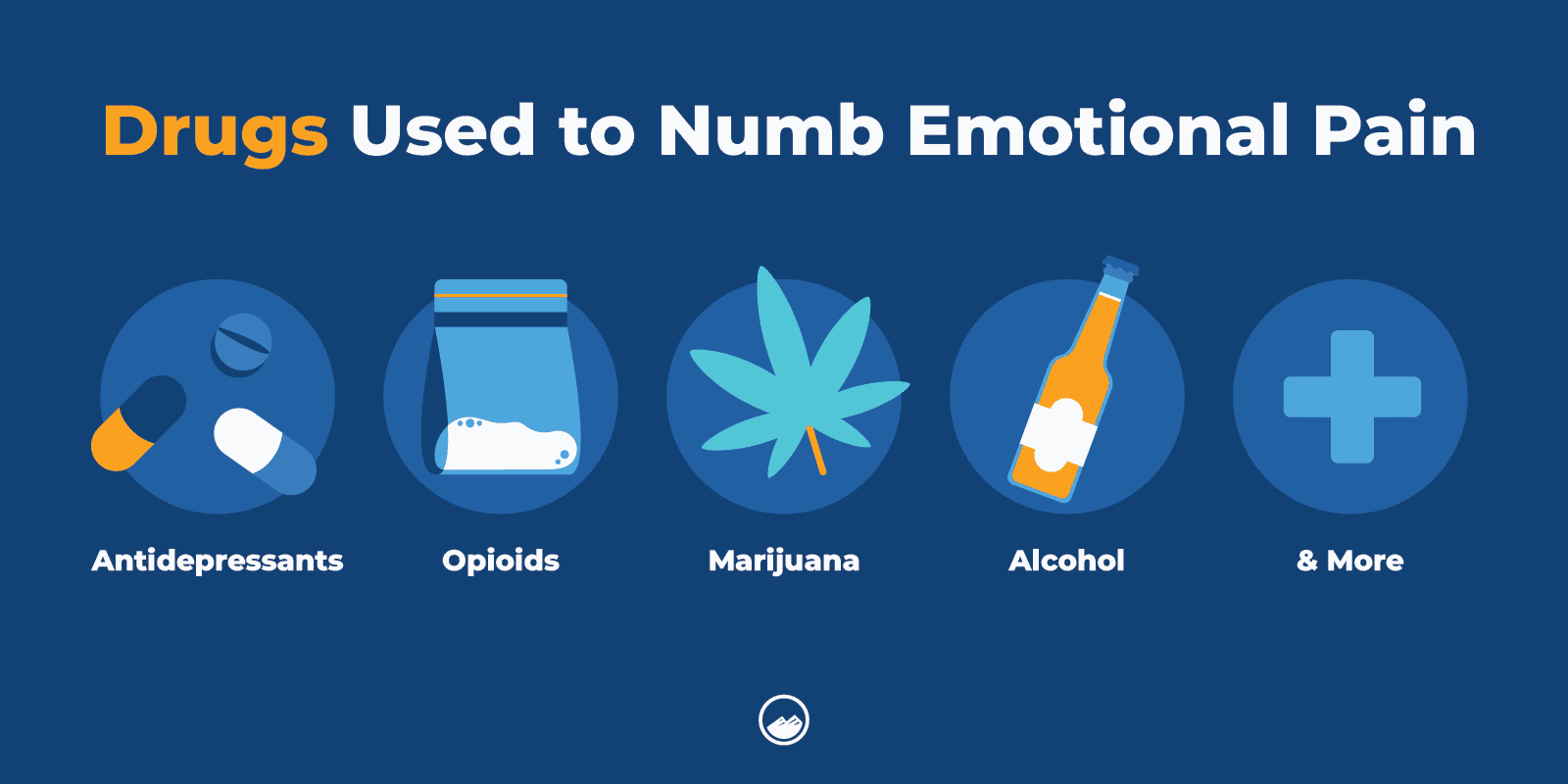
When substances are used to cope with negative emotions or lessen emotional pain, they’re only providing temporary relief. It isn’t a cure for feeling bad. This behavior can easily lead to dependence and substance use disorder (SUD).
What Is Depression Numbness?
Depression numbness occurs when certain brain chemicals and structures are affected by depression.
Imbalances in neurotransmitters like serotonin and dopamine can lead to reduced emotional responsiveness. These chemicals play key roles in regulating mood and pleasure, so when they’re out of balance, feelings may become muted.
Chronic stress associated with depression can raise cortisol levels, which disrupts areas of the brain involved in emotional processing, like the amygdala and prefrontal cortex.
This can further contribute to feelings of numbness and detachment.
For instance, someone who used to love painting might find they no longer feel inspired, saying, “I just don’t feel anything anymore.”
This emotional detachment is linked to the brain’s inability to process feelings effectively. Recognizing this numbness can help guide individuals toward seeking support and treatment to reconnect with their emotions.
Is Emotional Numbness Part of Anxiety?
Emotional numbness can be a symptom of an anxiety disorder.
When you have an anxiety disorder, you’re experiencing scary and intense emotions frequently. You might feel a sense of impending doom, a feeling of being in danger, or a constant gnawing worry that you can’t get rid of. These feelings can do a number on your mental well-being.
Because anxiety preys on your emotions so much, you may try to suppress those emotions, consciously or unconsciously.
This means that you try to ignore them or push them down. When you do that, you’re teaching your brain that not feeling is better than feeling.
This is how emotional numbness can develop out of an anxiety disorder.
After a while, you’ll naturally avoid feeling emotions to protect yourself from the anxiety symptoms. While it may alleviate your anxiety, it can present a whole new problem that is just as harmful.
Effects of Emotional Numbing
How Does Emotional Numbness Affect the Victim?
Emotional numbing is not a pleasant experience. Some effects that emotional numbness can have on the victim include:
- Feeling alienated from friends, family, and peers
- Using substances to cope with emotional numbness
- Feeling broken or abnormal
- Self-harming
- Suicidal thoughts/ideation
- Feeling guilty or ashamed of their lack of reactivity
- Becoming socially isolated
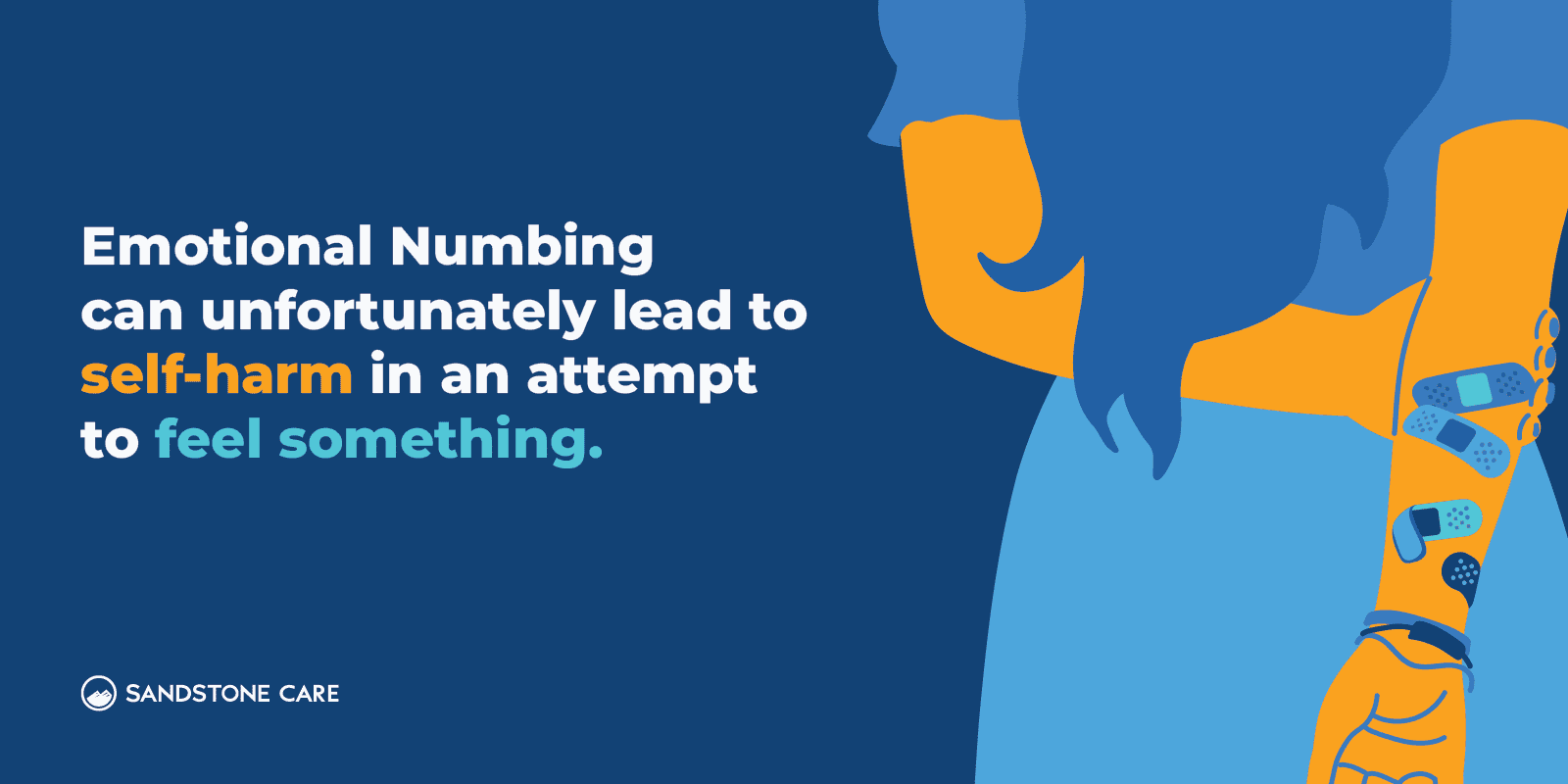
What Happens When You Suppress Your Emotions for Too Long?
Suppressing your emotions for an extended period of time can lead to emotional numbness.
This is why embracing your emotions is important, even if it’s painful. Suppression can harm your emotional processing abilities, leading to feeling numbness. Using methods to build emotional resilience can help you cope with difficult feelings without suppressing them.
How Long Does Emotional Numbing Last? Is It Permanent?
Emotional numbing can last hours to years, depending on the cause, severity, and if you receive treatment.
In some situations, emotional numbness may be a short-term response to a particularly stressful event. Sometimes the human brain needs extra time to process what has just happened; during that time, emotions may feel blunted or nonexistent. This is normal and may not be cause for alarm.
In other circumstances, emotional blunting can last weeks, months, or even years. This is usually due to a more serious cause like severe trauma or a mental health disorder. If you experience this, the best way to get back to normal is to seek mental health treatment options.
Unfortunately, some people may feel emotionally numb their entire lives, but that doesn’t mean that it’s always permanent. Permanent emotional numbness is rare. With the help of mental health professionals, emotional numbness can be treated and overcome.
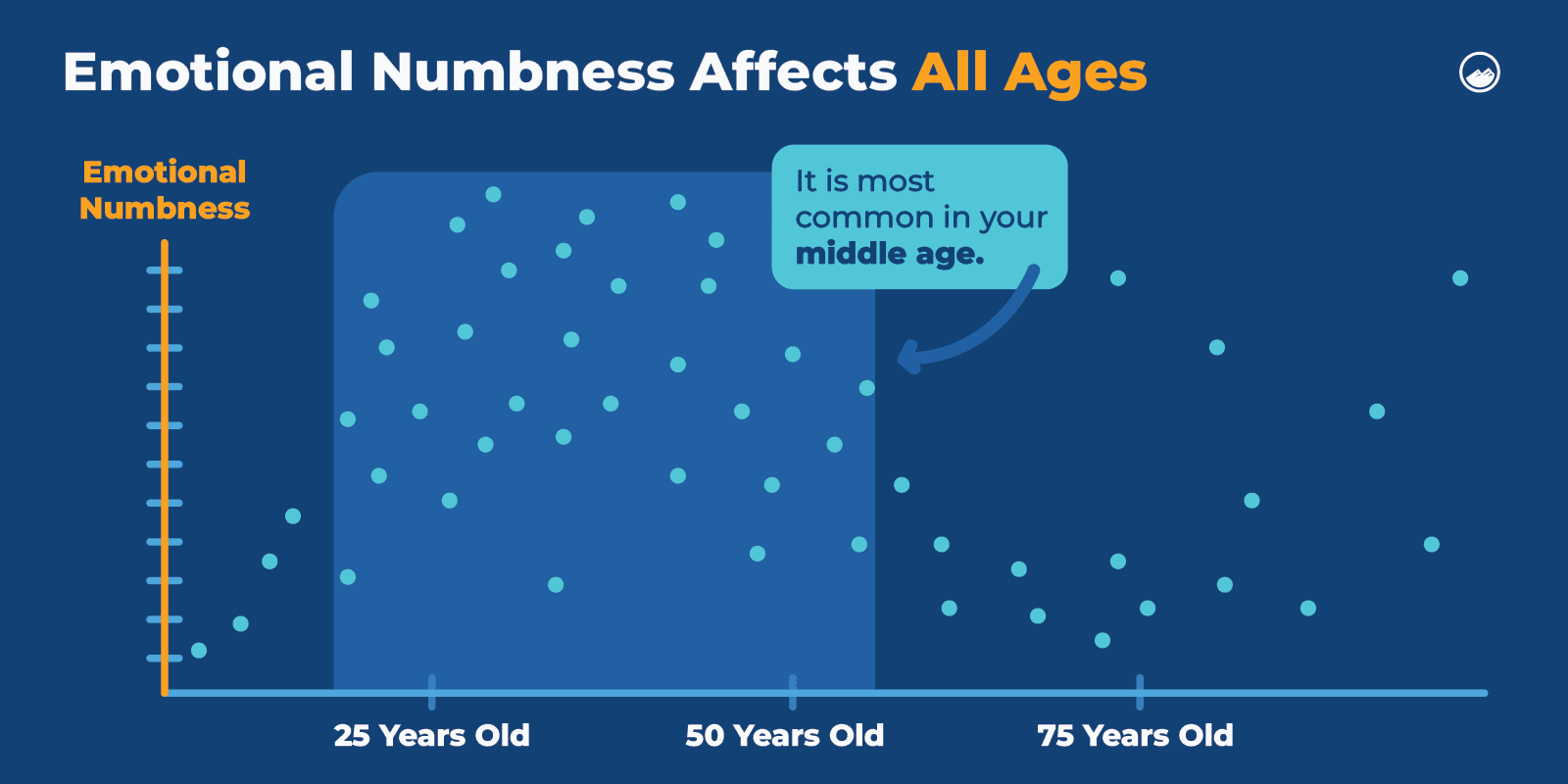
Coping Strategies for Emotional Numbness
Can Emotional Blunting Be Fixed? If So, How?
Getting rid of emotional numbness can be difficult, but it is certainly possible with professional mental health services.
Therapy is a powerful tool that is often used to overcome emotional numbness. The type of therapy is dependent on the individual case and the underlying cause. With the help of a professional, you should be able to make a treatment plan that works best for you.
One commonly used therapeutic intervention is cognitive behavioral therapy (CBT). TCBT aims to help you approach stressful problems with a healthier mindset. This can reduce stress and build your emotional resilience.
Other therapies may be suggested by your treatment team, such as mindfulness therapy, experiential therapy, or group therapy. Any of these can help treat emotional numbness. Keep an open mind and treat yourself gently through the process.
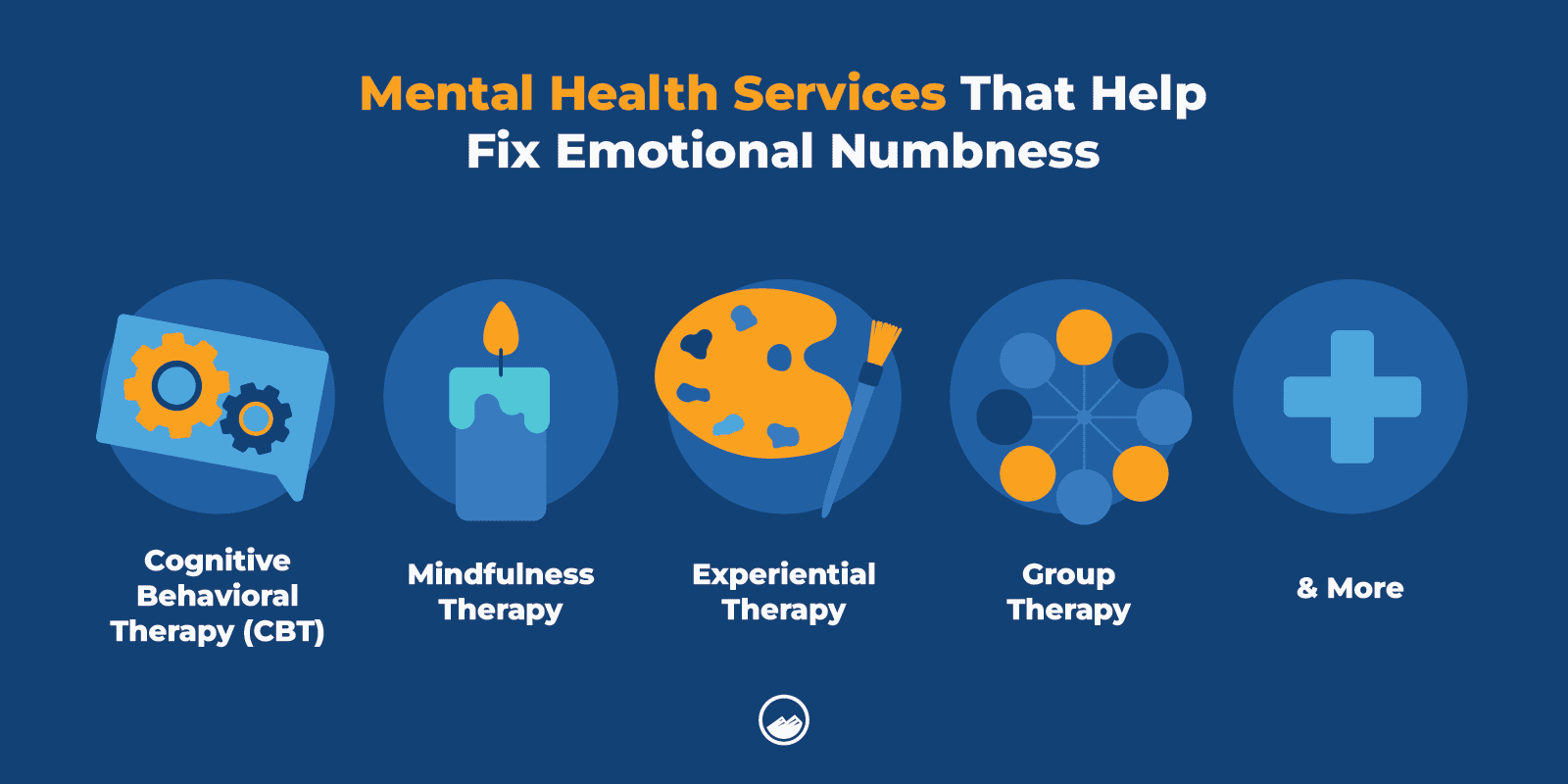
Can Online Therapy Like Betterhelp and Talkspace Help With Emotional Numbness?
Online therapy can be an excellent tool for treating emotional numbness.
A common misconception is that online therapy isn’t as effective as in-person talk therapy. This isn’t the case. A 2020 study published in the European Journal of Educational Research found that, in university students, online psychotherapy was just as effective as in-person options.
Online treatment options such as Betterhelp and Talkspace are great platforms for people who feel more comfortable doing therapy in their homes. The therapists are trained professionals who know how to treat various conditions that may be the underlying cause of your emotional numbness.
Building Emotional Resilience, Why Do I Lack Emotional Resilience?
A lack of emotional resilience can have many causes. Genetics, childhood experiences, and your current environment all play a role.
When you’re stressed out or overwhelmed, it’s easy to feel weak or lacking resilience. Remember, emotions are not a sign of weakness. Emotions are a normal part of life and a sign that you are alive and human. Embracing your emotions is always healthier than suppressing them.
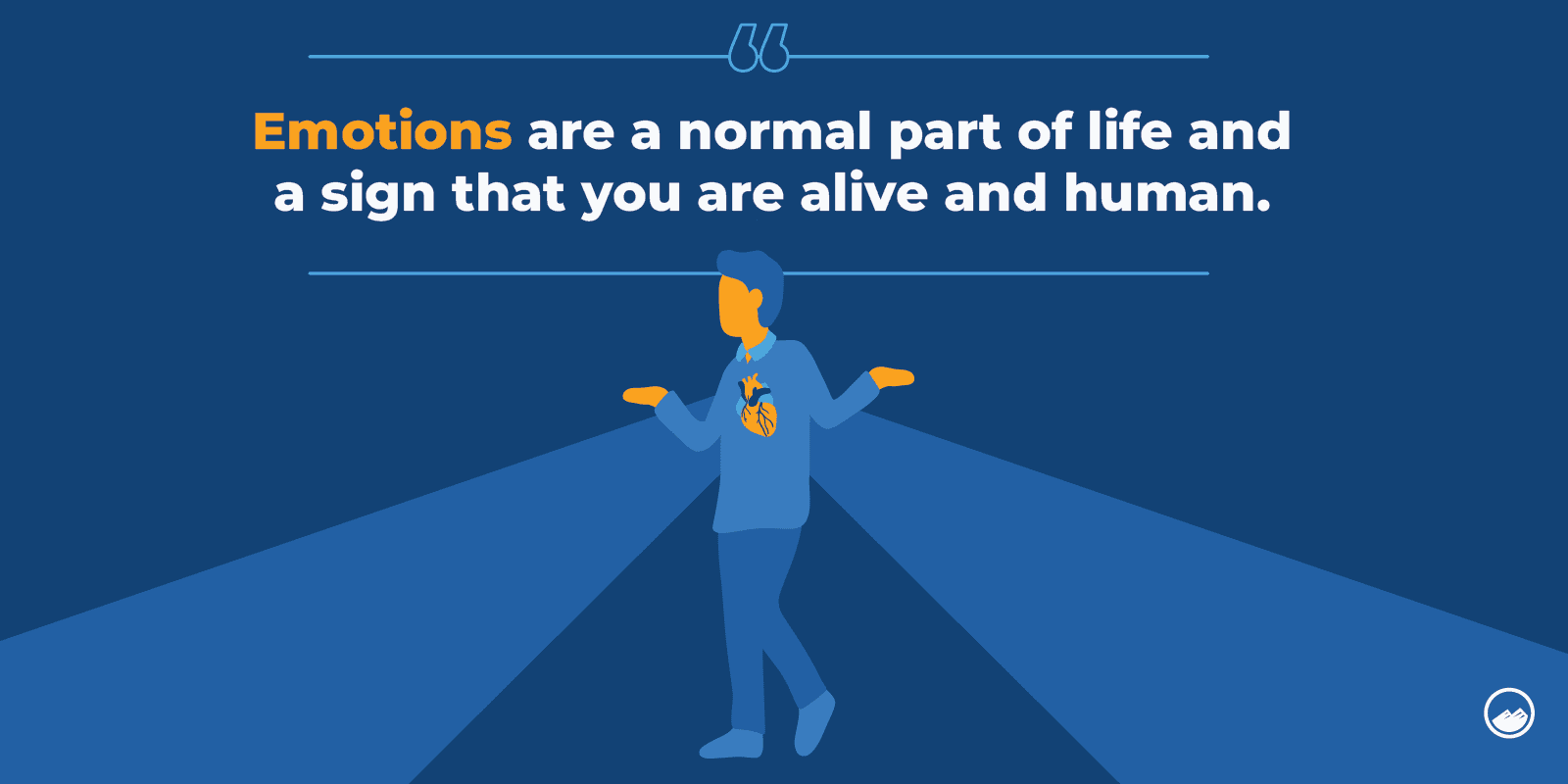
If you’re feeling emotionally hypersensitive or overly reactive, and it’s affecting your health, it might be a good idea to talk to a counselor or therapist. They can help you shift your mindset and approach emotional experiences from a healthier point of view.
What Are the Five Pillars of Emotional Resilience?
The five pillars of the resilience model can help you build emotional resilience and handle stressful experiences better. The five pillars of emotional resilience are:
- Self-awareness
This means taking note of your thoughts, feelings, beliefs, and motivations to understand yourself better. Being self-aware can help build a stronger sense of identity and self-esteem.
- Mindfulness
Being mindful means being fully present at the moment. You should focus your attention on your emotions and sensations and observe them without judgment. This practice can help you stay grounded. - Self-care
Self-care practices are things you do to nurture your mind and body. It can look different for everyone, depending on what you enjoy or find relaxing. This might mean taking time every day to read, journal, exercise, or watch your favorite show. Self-care nourishes positive emotions, especially in a life full of stressors. - Positive relationships
This pillar is especially crucial to building resilience. As social creatures, we draw our strength from our sense of belonging and community. Having strong, supportive, and loving relationships will give you a shoulder to lean on when you need it most. - Purpose
Having a sense of purpose in life drives you forward and keeps you focused on progress. It can give you a feeling of serving something bigger than yourself. This can be religion, but it doesn’t have to be. Your purpose could simply be to nourish your health and wellness.
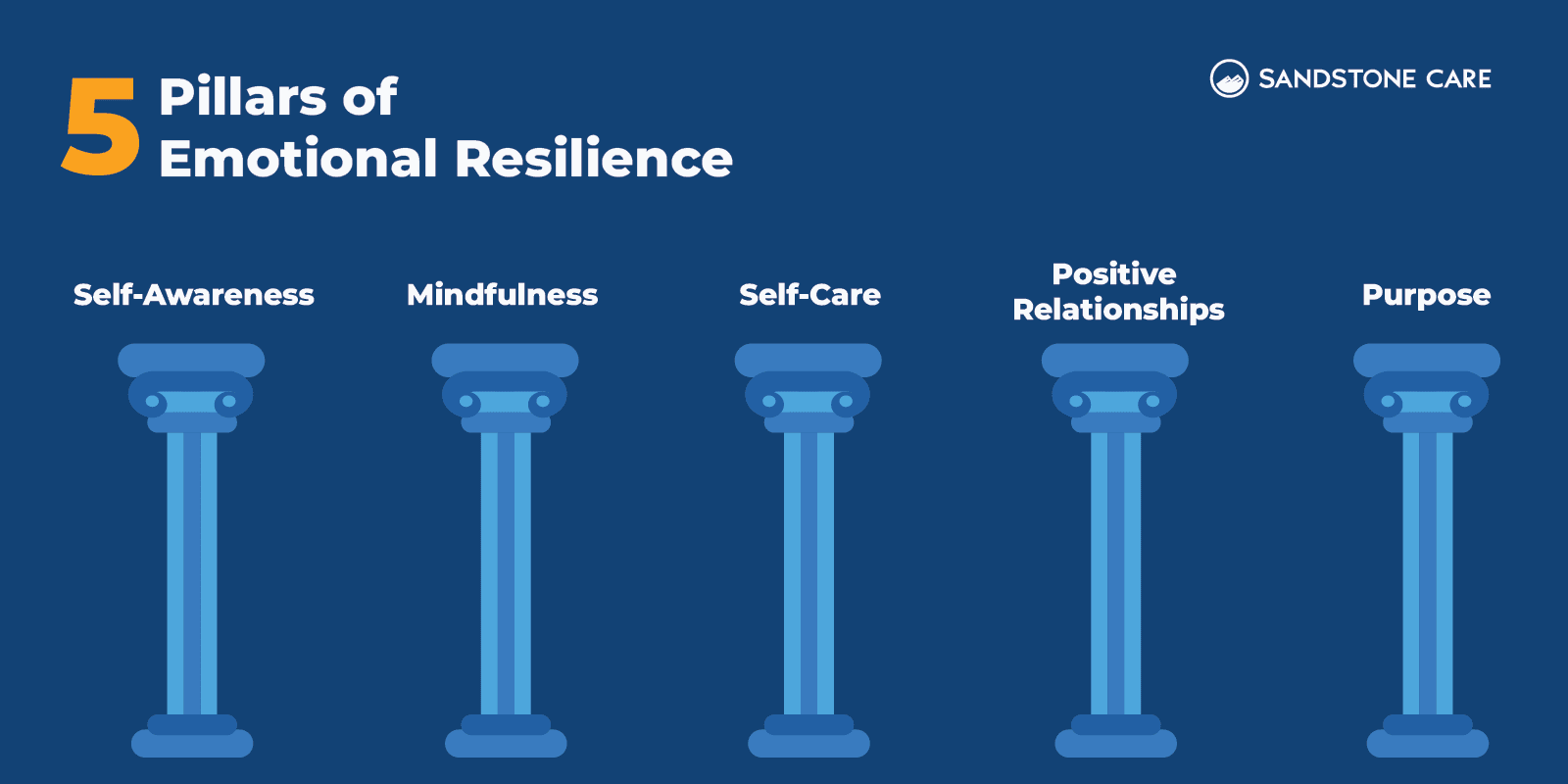
What Are the Seven C’s of Emotional Resilience?
The Seven C’s of emotional resilience are:
- Competence: the ability to know how to handle stressful situations effectively.
- Confidence: the belief in one’s abilities.
- Connection: a sense of security and belonging.
- Character: a sense of self-worth, identity, and beliefs.
- Contribution: making a difference in the world around you.
- Coping: skills that build resilience
- Control: knowing that you are in charge of your decisions and actions
Having these seven things can put you on the path to being more emotionally resilient and having overall better mental health.


Let’s Take the Next Steps Together
Emotional numbness is a symptom of many mental health disorders, substance abuse, or could be a side effect of medication. Therapies like cognitive behavioral therapy can help you start to feel your emotions again and improve your well-being. Sandstone Care supports teens and young adults with mental health and substance use disorders.







